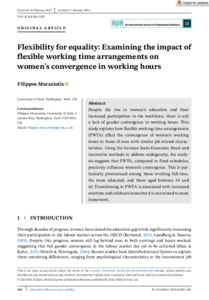Flexibility for equality: Examining the impact of flexible working time arrangements on women's convergence in working hours

British Journal of Industrial Relations
2024
62
2
June
410-445
flexible working time ; women workers ; child care ; gender equality
Gender equality & Women
https://doi.org/10.1111/bjir.12787
English
Bibliogr.
"Despite the rise in women's education and their increased participation in the workforce, there is still a lack of gender convergence in working hours. This study explores how flexible working time arrangements (FWTA) affect the convergence of women's working hours to those of men with similar job-related characteristics. Using the German Socio-Economic Panel and innovative methods to address endogeneity, the analysis suggests that FWTA, compared to fixed schedules, positively influence women's convergence. This is particularly pronounced among those working full-time, the more educated, and those aged between 30 and 45. Transitioning to FWTA is associated with increased overtime and childcare hours but it is not related to more housework."
Digital
The ETUI is co-funded by the European Union. Views and opinions expressed are however those of the author(s) only and do not necessarily reflect those of the European Union or the ETUI.